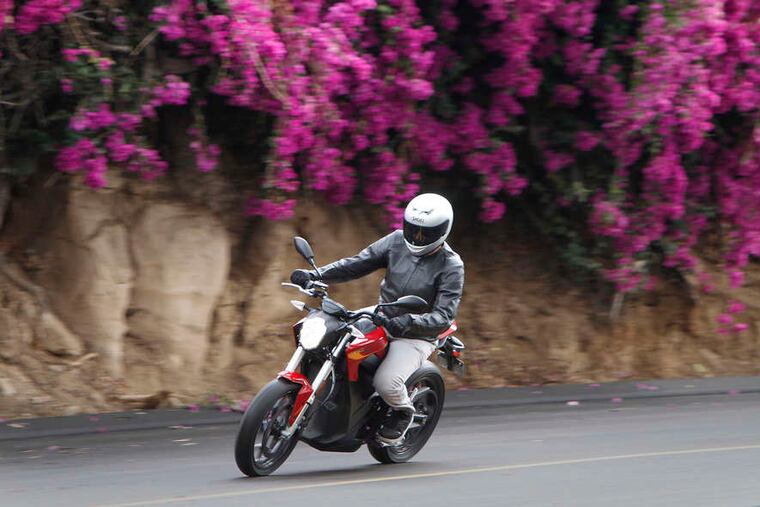Zero Motorcycles runs with the big boys
As Harley and others move in, the small California maker of electric bikes is upping its game.

SCOTTS VALLEY, Calif. - This time last year, Zero Motorcycles could comfortably claim to be the world's leading maker of electric motorcycles.
Then Harley-Davidson unveiled its electric LiveWire concept bike, and Polaris Industries acquired Brammo Motorcycles, positioning itself to match Harley.
Suddenly dwarfed, the California bikemaker responded by upping its game. Zero has doubled its staff from about 60 to about 130, added vice presidents of marketing and quality, and doubled its production capacity.
In addition to Harley and Polaris (parent company of the Indian and Victory motorcycle lines), BMW has put an electric scooter on the market. KTM has begun selling an electric dirt bike, and Yamaha has said it will put two electric motorcycles into production by 2016.
Zero is still a small player. It built 1,300 high-end electric motorcycles in 2014 and will build 1,800 this year, the company says. By comparison, Harley-Davidson, the country's largest manufacturer, builds that many gas-powered bikes every two days.
Still, Zero welcomes the motorcycle giants.
"We were thrilled by Harley's LiveWire, and Polaris coming in is good, too," chief executive Richard Walker said recently. "This validates what we're doing. When the big boys come in, it helps."
Zero also has gotten help this year in the form of improved components. Some top-end suppliers, previously dubious about Zero's chances, have partnered on the 2015 models.
New forks and suspension are made by industry leader Showa. The ABS braking system wears the Bosch label. The bikes themselves wear Pirelli Diablo Rosso tires.
"It took us a while to get these companies on board," said chief technology officer Abe Askenazi. "There was a time when no one returned our calls. Now, we lead the space. They know we're going to be around."
Privately held Zero was founded by a former NASA engineer in 2006, when out of a tiny strip-mall garage it began marketing what looked like a motorized mountain bike.
The company began selling street bikes in 2009 and has gradually refined the components and broadened the product line. Zero now sells four on-road electric machines, with versions specially outfitted for military and law enforcement users.
The machines are hand-assembled in a quiet, high-ceilinged factory, where on a recent weekday about 30 workers were busy turning baskets of parts into Zeros.
The completed bikes undergo the same rigorous testing as motorcycles coming off the line at Ducati or Honda. In one room, a just-built bike was being run at extreme speeds on a dynamometer, a machine that measures horsepower.
In another, Zero batteries were subjected to a 15-minute "water test" to ensure they won't short out in a rainstorm. (A battery prototype was submerged in a nearby harbor for 24 hours, Zero says, and performed well afterward.)
The company has claimed the batteries are good for more than 400,000 miles, and warranties them for five years or 50,000 miles for the entry-level FX, and up to five years or 100,000 miles for the S, DS, and SR models.
Proponents of electric motorcycles tout their minimal impact on the environment, savings at the gas pump, and low maintenance.
Zero is not operating in a vacuum. Brands such as San Francisco-based Mission, San Carlos-based Lightning, and Italy's Energica all build high-speed, high-performance, high-priced electric superbikes.
All are niche players in a niche segment and sell only a handful of units every year. The technology's most potent marketing tool has been the test ride.
Prospective customers, even dubious ones, end their inaugural runs with an almost universal reaction, whatever the brand.
"The first thing everyone says is 'power,' " said Scot Harden, a former pro racer who is Zero's vice president of global marketing. "That's why we don't lead with the green issue or the lower-cost-of-maintenance issue. We market the magic carpet ride."
Zero's flagship SR produces the equivalent of 67 horsepower and 106 foot-pounds of torque. At under 400 pounds, it's capable of going 0 to 60 m.p.h. in 3.3 seconds, with a top speed of 102 m.p.h.
A Ducati Monster 821, for comparison, weighs about the same and boasts 112 horsepower and 66 foot-pounds of torque. It costs $11,495, to a Zero SR's $17,345. But the Monster doesn't get to 60 m.p.h. quite that quickly, and it isn't electric.
Company executives recognize that Zero's large price tag and 45-dealer network are hampering growth.
Then there's the cost. Though entry-level Zeros sell for about $10,000, the Zero SR, with the range-extending battery pack, costs closer to $20,000.
"Price is the No. 1 reason people say they're not buying a Zero after a demo ride," CEO Walker said.